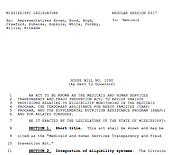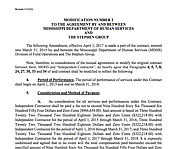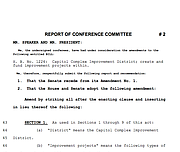Wednesday, April 5, 2017
Sen. Brice Wiggins, R-Pascagoula, faced a barrage of questions from Democratic senators about a welfare fraud measure on the last day of session. Photo by Imani Khayyam.
JACKSON — Cities and universities can no longer establish sanctuary policies in Mississippi. Any felony targeting a law enforcement officer is subject to enhanced hate-crime penalties. Domestic violence could be a "cruel and inhuman" ground for divorce in the state. Mississippians receiving government assistance may have a harder time applying for government assistance.
The raucous legislative session ended a few days early on March 29 with those successful bills headed to Gov. Phil Bryant for signature, but without budgets in place for the state's transportation needs or to fund the attorney general's office.
'A Sweetheart Deal'
In the final hours of the session, Senate Republicans fixated on cracking down on welfare fraud in the state, while Democrats were reluctant to accept their proposal. It took over an hour for the Senate to pass the formerly titled "HOPE Act," now called the "Medicaid and Human Services Transparency and Fraud Prevention Act."
If it becomes law, the Division of Medicaid and the Department of Human Services could contract with third-party vendors in order to improve how the state checks a Mississippian's eligibility for government medical coverage and food assistance programs. The new screening procedures will affect residents who apply to receive Medicaid medical coverage, the Supplemental Nutrition Assistance Program and the Temporary Assistance for Needy Families programs. Currently, Medicaid and MDHS check their clients' eligibility status once a year. House Bill 1090 would change that, making eligibility verification a faster, more seamless process.
The act's critics say it will kick families and children off government assistance rolls for minor problems, such as clerical errors in reporting or how a person filled out their application. The Mississippi Center for Justice and the Mississippi Low-Income Child Care Initiative oppose the legislation and say in a press release that the bill will "take a serious toll on Mississippi's safety net."
If Medicaid or MDHS workers find problems with an application, they send the applicant a notice about the issue. Under HB 1090, that person then has 10 days to respond, before losing their benefits. Both the Division of Medicaid and MDHS are working on speeding up their process of verifying and checking to see if clients are eligible—but not fast enough.
Sen. Brice Wiggins, R-Pascagoula, who chairs the Senate Medicaid Committee, told his chamber that the goal is to ensure that the state's welfare programs use the taxpayers' dollars effectively.
Senate Democrats grilled the chairman on several provisions that have little to do with eligibility, like the 10-day response rule as well as how much the legislation will cost the state with most agencies already taking budget cuts. Wiggins said the law would cost $500,000 to implement, but an independent analysis from the New Hampshire-based Stephen Group, a contractor with a current $966,000 deal with MDHS, shows that HB 1090 will cost between $1 million to $2.6 million annually.
John Stephen, who prepared the analysis, told the Jackson Free Press that his study used what Texas, Florida, Illinois and Michigan do to check a person's eligibility for assistance. He estimates that the law could save the state $30 million to $60 million, mostly on the Medicaid side.
"Currently, if someone moves out of state within the year they're on Medicaid, they're supposed to tell the state that they moved," Stephen said. "The state is paying a managed-care vendor, so if they're able to identify that someone has moved out of state, then they can stop paying (that vendor) for the rest of the year."
The legislation says that the amount the state "saves" should exceed the total cost for implementing the system, but the system cannot start without upfront costs. Stephen said it is expensive to pay third-party vendors for information like credit and banking records, which the bill would enable Medicaid and MDHS to pay private vendors to do, but paying third parties is much cheaper than the agencies trying to go get the data themselves.
Wiggins reiterated the cost-savings point several times last week.
"We've given the ability to re-negotiate or cancel the contracts. ... We put the efficiency language in there to give them the flexibility to ensure that the savings exceed the cost," Wiggins said on the Senate floor.
Sen. Hob Bryan, D-Amory, was the only lawmaker of the six assigned to work on the final version bill who did approve of it. He said finding fraud and using data to assess the problem is important. But, he added, he and his colleagues are resisting the assumption at the heart of the bill.
"What is driving some of us up the wall and what is frustrating about this is the notion that somehow an entire class of people who are receiving TANF, Medicaid and other benefits are a bunch of clever, crafty people out to steal money from hard-working folks, and if we could crack down on this we could balance the state budgets," Bryan said.
"That's what creates so much of the turmoil. This legislation did not originate in the state of Mississippi; it originated from a think tank. (The bill) is not tailored to Mississippi; it contains pages and pages of complicated and not necessary language—and it certainly seems to be intended to create a sweetheart deal for a private entity."
The Foundation for Government Accountability, based in Naples, Fla., wrote the bill template.
After an hour of debate on the last day of the session, the Senate approved the measure mainly along party lines, with most Republicans sending it to the governor's desk. If he signs it, the Division of Medicaid and MDHS will have to enter into contracts and implement the new eligibility verification system by July 2019.
Target: 'Sanctuary'
Despite news of several Immigrations and Customs Enforcement raids throughout the state, Gov. Bryant has continued to toe his hard line on immigration in the wake of Trump's presidency. It was no surprise when Bryant signed Senate Bill 2710 to prohibit "sanctuary" policies statewide last week. The only city with such a policy is Jackson, which passed an anti-profiling ordinance in 2010 that makes it unlawful for law enforcement officers to ask about a person's immigration status.
"We want to make sure today that they clearly understand as do all Mississippians that it will be against the law to form such a sanctuary city or university," Bryant said before signing the bill, comments released in a Facebook video.
In March, ICE released a detained immigrant raised in Mississippi, who was in the process of applying for her Deferred Action status. Daniela Vargas was in prison for several days before her story drew national attention and ICE agents released her. Lawyers and advocates are preparing families with action plans in case ICE detains a family member.
Divorce Law Clarified
After public backlash for killing legislation to add domestic violence as grounds for divorce, Rep. Andy Gipson, R-Braxton, waged a media campaign saying domestic violence was already grounds for divorce under the state's "habitual cruel and inhuman" ground, even as critics pointed out that the word "habitual" still indicated the need for repeated incidents.
Under fire, Gipson eventually added language to Senate Bill 2680. The bill states that abused and neglected children can go to relatives or family members instead of foster care in certain cases. Gipson's amendment added that the state's "cruel and inhuman" ground for divorce includes spousal domestic abuse—physical, emotional and verbal. On the House floor, he said the State was clarifying the definition already in state law. The seventh ground for divorce now says, "spousal domestic abuse may be established through the reliable testimony of a single credible witness, who may be the injured party...."
Expanding Dyslexia Vouchers
The House won the dyslexia voucher fight when both chambers adopted Rep. Toby Barker's, R-Hattiesburg, initial bill language: making the vouchers available to students in grades 1-12 instead of through 6th grade. The bill also includes language to beef up the required dyslexia screener tests local school districts are required to administer to kindergartners and first graders.
The voucher bill caused uproars in both chambers this session due to amendments that would have allowed students to take their vouchers to out-of-state private schools, but all of that language died in conference. Students can use the vouchers at public or state accredited nonpublic special-purpose schools. Vouchers are about $5,000 per student, a cost far below most private school tuitions in the state.
Rebuilding Jackson
The Capitol Complex Improvement District bill, promising to give a portion of sales-tax revenues collected on business activities in Jackson back to the city for infrastructure costs, passed both chambers by large margins last week. The funding influx is set to start on or before Aug. 15, 2018, the bill says, and Mayor Tony Yarber said that the initial dollar amount would be more than $3 million.
"Any funding that comes into City of Jackson is a win for Jackson. It will give us an opportunity to move funds in certain areas to areas that typically haven't seen any real investment," Yarber said.
"So it's a win whether you live in north, south, east or west Jackson."
The diverted tax revenue starts at a 2-percent level and incrementally increases in subsequent years. Unlike Jackson's 1-percent sales tax, these new diversions are not additional taxes; instead, more of the money currently collected from Jackson businesses will fund the district's expenditures.
The Capitol Complex district's western border is at Jackson State University with its area including downtown and north to include the Jackson Medical Mall, the University of Mississippi Medical Center and a chunk of Fondren.
The district expands east, across Interstate 55, to the Mississippi Museum of Natural Science and the Pearl River.
House Bill 1226 has been in the works since 2014, Yarber told the Jackson Free Press, and likely passed because the City engaged state leaders early and often.
The legislation establishes a nine-member committee to advise the Mississippi Department of Finance and Administration on what improvement projects need funding. The Jackson mayor, a city council representative and several government appointees, including from Jackson State University and the University of Mississippi Medical Center, will be on the committee.
"Improvement projects shall be coordinated with the City of Jackson to the greatest extent possible," the bill says. However, improvement projects "shall not be subject to approvals, permits or fees assessed by the City of Jackson."
Yarber said he has a list of projects the committee could consider.
Sen. John Horhn, D-Jackson, who is running for mayor against Yarber this spring, held a press conference to celebrate the legislation on Wednesday.
Explaining one potentially controversial component, Horhn said the law will extend the Mississippi State Capitol police's authority to make arrests in the entire district. He emphasized that their law-enforcement authority will run in concurrence with the Jackson Police Department and the Hinds County Sheriff's Department.
Email state reporter Arielle Dreher at [email protected] and follower her at @arielle_amara on Twitter.






